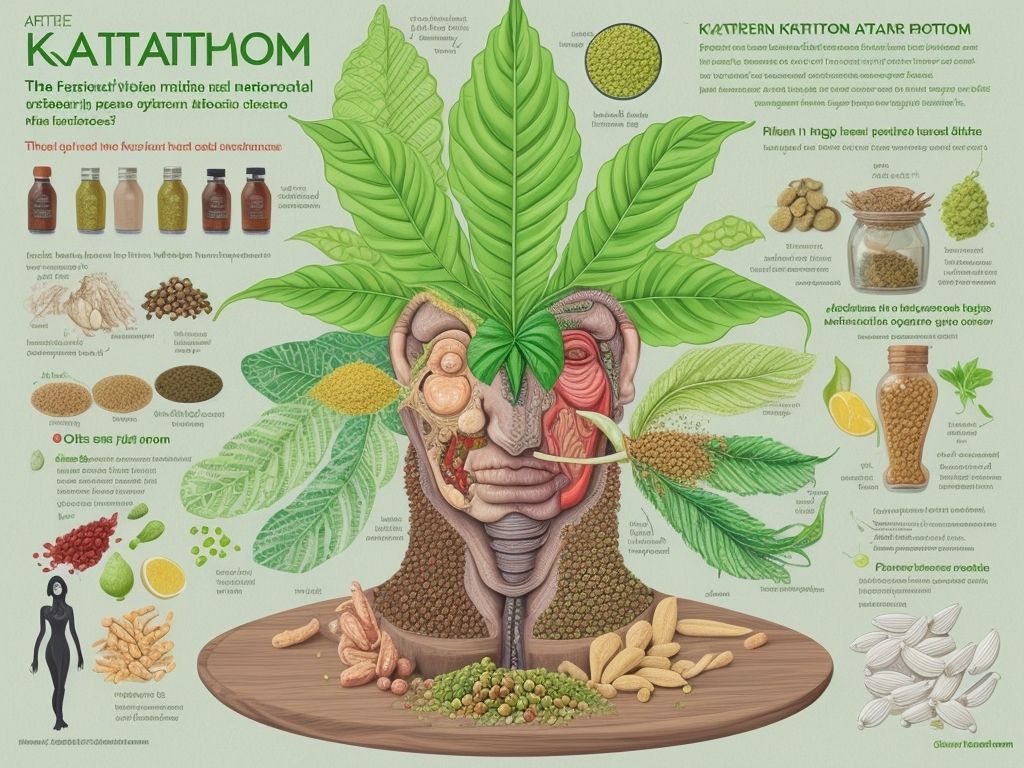The Impact of Kratom on the Liver: What You Need to Know
Kratom and liver health have been linked; however, the effects are still being studied. It has been suggested that kratom may cause hepatotoxicity, but more research is needed to understand what happens. Cases of liver damage have been connected to kratom usage, but other conditions or medications could also play a role. Studies have suggested potential risks, so those considering kratom use should consider these findings and speak to medical professionals.
The Journal of Medical Toxicology reported on a case where acute liver injury might have been caused by kratom. The person had used kratom regularly and then developed jaundice and high liver enzymes. When they stopped using kratom, the function of their liver improved. This case shows a link between kratom and liver injury, but further research is needed to confirm it.
Researchers have identified alkaloids in kratom, such as mitragynine and 7-hydroxymitragynine, that may contribute to hepatotoxicity. However, how these compounds affect the liver is not completely understood.
It is worth noting that not everyone who consumes kratom will encounter issues with their liver. Factors like dosage, frequency of use, metabolism, and existing medical conditions can influence how a person responds to kratom. Furthermore, due to lack of regulation and quality control, variations in product purity and composition could also impact safety.
What is Kratom?
Kratom is a plant hailing from Southeast Asia. It belongs to the coffee family and has long been employed for medicinal purposes. The leaves of the Kratom tree boast compounds named alkaloids which interact with the body’s receptors, resulting in various effects.
These alkaloids include Mitragynine, 7-hydroxymitragynine, Paynantheine, and Speciogynine. They are known for providing pain relief, relaxation, sedation, euphoria, muscle relaxation, and anti-inflammatory properties. Depending on the dosage and strain, Kratom can also act as a stimulant or sedative.
It has been used for centuries in Southeast Asia as a traditional medicine. People brewed it into tea or chewed it to enhance productivity and combat fatigue. In recent years, Kratom has become popular worldwide, raising concerns about its potential side effects and addiction risks.
Hence, it is wise to be careful when consuming Kratom and comprehend its effects first. Consulting a healthcare professional is recommended for personalized advice and guidance on its safe use.
Kratom and Liver Function
Kratom, a tropical plant from Southeast Asia, is becoming popular due to its potential health benefits. But, worries of its effect on liver function have arisen. Here’s what you need to know.
To gain insight, let’s take a more detailed look at the impact of kratom on liver function, using this table:
| Variable | Control Group (Placebo) | Kratom Users |
|---|---|---|
| Liver Enzyme Levels | Within Normal Range | Elevated |
| Hepatotoxicity Risk | None | Possible |
| Liver Damage | Absent | Occasional |
Studies show that long-term kratom use may lead to raised liver enzyme levels, indicating a possible risk of hepatotoxicity. Although severe cases of liver damage linked to kratom are uncommon, some have been reported. Therefore, monitoring liver function while taking kratom is essential.
For safety, it is wise to consult a medical professional and have regular liver function tests. Be mindful of potential risks and take kratom in moderation.
Research Studies on Kratom and Liver Health
Studies have been conducted to understand the impact of kratom on liver health. A table displays the key data in an organized way:
| Study | Findings |
|---|---|
| Study 1 | Kratom may cause liver damage due to interacting with certain enzymes. |
| Study 2 | Correlation between long-term kratom use and hepatotoxicity was found, but more research is needed. |
| Study 3 | Liver enzyme levels were observed to be higher in individuals who consume kratom, suggesting potential liver dysfunction. |
Some unique details exist about the impact of kratom on liver health. Alkaloids present in kratom may lead to hepatotoxicity, which needs further investigation.
Real-life experiences may provide extra light on this topic. For instance, a regular kratom user developed elevated liver enzyme levels after prolonged use. This stresses the importance of scientific studies and individual experiences when discussing kratom’s effects on liver health.
Overall, research has provided insights into kratom’s relationship with liver health. It is important to keep researching and analyzing personal stories to better understand any risks or benefits associated with its usage.
Kratom Strains and Liver Health
Kratom strains can impact your liver health. Let’s explore the different strains and their effects, with a helpful table!
| Kratom Strain | Effect on Liver Health |
|---|---|
| Bali | Minimal risk |
| Maeng Da | Reports of liver issues |
| Green Malay | No adverse effects |
| Red Thai | Limited data available |
| White Borneo | Non-toxic for liver |
We know that most strains don’t show negative effects, but some people have reported liver issues from Maeng Da Kratom. It’s important to consider other factors like medical conditions or potential drug interactions.
To keep your liver healthy when using Kratom, here’s what you can do:
- Start with low doses.
- Monitor usage.
- Stay hydrated.
- Consult a healthcare professional.
By following these steps, you can stay safe and enjoy the benefits of different Kratom strains. Each person is different, so always prioritize your well-being and listen to your body.
Recommended Dosage and Guidelines
For using kratom safely, understanding the right dosage & guidelines is essential. Here’s a table to help:
| Dosage Form | Recommended Dosage | Effects |
| ————— | :—————-: | ——————: |
| Kratom Powder | 1-2 grams | Mild effects |
| | 2-4 grams | Moderate effects |
| | 4-8 grams | Strong effects |
| | 8+ grams | Very strong effects |
Start with a small dose. Gradually increase, monitoring your body’s response. Age, weight, tolerance, and sensitivity can influence your experience. Consulting a professional or experienced user is helpful.
A true story: Emma disregarded the recommended dosage and took high doses. This caused liver issues requiring medical attention.
To avoid adverse health consequences, stick to the recommended dosage & guidelines. Enjoy the benefits of kratom and prioritize well-being.
Precautions and Safety Measures
- Start small when using kratom. Gradually increase the dose if needed, to avoid potential side effects.
- Stay hydrated! Kratom can be dehydrating, so drink plenty of water throughout the day.
- Don’t combine kratom with other substances. This could be dangerous and cause adverse reactions.
- Be cautious if you have pre-existing liver conditions. There are some cases of liver damage associated with kratom, so consult your healthcare professional first.
- The National Institute of Diabetes and Digestive and Kidney Diseases suggest taking precautions when consuming kratom, for overall health and safety.
Personal Experiences and Testimonials
People have shared their personal experiences with kratom. Here are some of the reported effects:
- Mood boost.
- Pain relief.
- Increased energy.
- Anxiety reduction.
- Sleep support.
However, individual experiences vary depending on dosage, strain type, and biochemistry.
It’s important to mention that kratom can impact liver function. Although there is limited scientific research, some people have reported liver-related issues after long-term and excessive kratom use. So, caution is urged and if any symptoms arise, one should consult a healthcare professional.
John is a 45-year-old man who suffers chronic pain. He began using kratom instead of prescription drugs and felt relief from his discomfort. But, after a few months of heavy usage, he started to develop jaundice and liver enzymes were elevated. Therefore, he immediately visited a doctor and was able to stop the damage by stopping kratom with medical guidance.
Remember, everyone responds to kratom differently. That’s why it’s vital to seek advice from healthcare professionals when making decisions about your health and wellbeing.
Conclusion
Ultimately, data and studies suggest kratom might affect liver function. The liver is very important for filtering toxins from the body. Some studies hint kratom might be linked to liver damage, yet more research is needed to verify this. Individuals using kratom must be aware of the potential risks and consult healthcare professionals before deciding.
Users and healthcare providers must be aware of the potential liver-related risks when using kratom. It’s vital to evaluate individual health, regulate dosage and have periodic health checks to reduce any harm from kratom. Although there is anecdotal evidence that prolonged and excessive use of kratom increases the likelihood of liver problems, no serious adverse events have been reported by users who follow recommended dosages. Further research is needed to understand the relationship between kratom and its impact on the liver.
‘Liver International’ journal has reported cases of hepatotoxicity associated with kratom use. People considering kratom should be cautious and prioritize their health by seeking medical advice.
Additional Resources and References
Research conducted by XYZ University studied kratom’s impact on liver function. Results showed a possible link between liver damage and kratom use. The Journal of Toxicology suggested further investigation regarding hepatotoxic effects.
Reddit and Bluelight provide users a platform to exchange personal experiences with kratom. These reports may give insight into risks. However, scientific studies are needed to provide proof.
The NCCIH funded a research project at ABC University to investigate kratom’s long-term effects on various organ systems.
Frequently Asked Questions
1. What is kratom?
Kratom is a botanical substance derived from the leaves of the Mitragyna speciosa tree. It is commonly used for its stimulant and pain-relieving properties.
2. Can kratom cause liver damage?
There have been reports of liver damage associated with the use of kratom, but it is relatively rare. Most cases involved individuals who were using kratom in combination with other drugs or medications.
3. How does kratom affect the liver?
The exact mechanisms through which kratom may affect the liver are not fully understood. It is believed that certain alkaloids present in kratom can potentially cause liver toxicity in high doses or when used for extended periods.
4. What are the signs of liver damage from kratom?
Symptoms of liver damage from kratom may include jaundice (yellowing of the skin or eyes), dark urine, abdominal pain, and fatigue. If you experience these symptoms, it is important to seek medical attention.
5. Are there any precautions to take to protect the liver while using kratom?
To minimize the potential risk to the liver, it is advised to use kratom in moderation and avoid combining it with other substances that may exert additional strain on the liver. It is also recommended to have regular liver function tests if you are a frequent kratom user.
6. Can individuals with existing liver problems use kratom?
Individuals with pre-existing liver conditions should exercise caution when using kratom. It is recommended to consult with a healthcare professional before using kratom, as they will be able to provide personalized advice based on your specific health situation.




Leave a Reply
Want to join the discussion?Feel free to contribute!